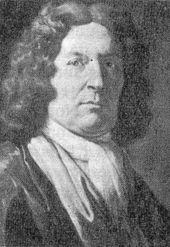Bernardo Pasquini

Bernardo Pasquini (7 December 1637 – 21 November 1710) was an Italian composer of operas, oratorios, cantatas and keyboard music. A renowned virtuoso keyboard player in his day, he was one of the most important Italian composers for harpsichord between Girolamo Frescobaldi and Domenico Scarlatti, having also made substantial contributions to the opera and oratorio.
Biography
Pasquini was born at Massa in Val di Nievole (today Massa e Cozzile), Grand Duchy of Tuscany. He was a pupil of Mariotto Bocciantini in Uzzano. Around 1650 he moved to Ferrara with his uncle Giovanni Pasquini. In 1654–55 he was organist of Accademia della Morte. Later he moved to Rome and in 1657 became organist of Santa Maria in Vallicella (Chiesa nuova). In November 1667 entered to the service of Prince Borghese. In February 1664 he was appointed organist of the Basilica di Santa Maria Maggiore and Santa Maria in Aracoeli. As a composer and keyboard player, he collaborated to the music performances patronised by most famous patrons in Rome, such as cardinals Flavio Chigi, Benedetto Pamphilj, Pietro Ottoboni, and Queen Christina of Sweden in whose honour his operas L'Alcasta (libretto by Giovanni Filippo Apolloni), and Il Lisimaco (libretto by Giacomo Sinibaldi) were performed respectively in 1673 and 1681.[1]
Together with Arcangelo Corelli and Alessandro Scarlatti, in 1706 Pasquini became member of the Academy of Arcadia.
He composed numerous operas, all staged in Rome between 1672 and 1692, and partially replayed in several Italian theatres (Florence, Pisa, Naples, Ferrara, Perugia, Genoa, Rimini etc.).
Pasquini died at Rome, and was buried in the church of San Lorenzo in Lucina.
One of his harpsichord pieces was transcribed for orchestra by Ottorino Respighi for his suite Gli uccelli.[2]
Works
- La sincerità con la sincerità ovvero il Tirinto (1672)
- L'amor per vendetta ovvero l'Alcasta (1673)
- La donna ancora è fedele (1676)
- Trespolo tutore (1677)
- Dov'è amore è pietà (Ipermestra) (1679)
- Idalma ovvero chi la dura la vince (1680)
- Il Lisimaco (1681)
- La Tessalonica (1683)
- Arianna (1685)
- Santa Dinna (1687; only act 2)
- I giochi troiani (1688)
- La caduta del regno delle Amazzoni (1690)
- Alessio (1690)
- Il Colombo overo l'India scoperta (1690)
- Eudossia (1692)
He also composed a number of oratorios.
- Caino e Abele (1671)
- Agar (1675)
- Assuero (1675)
- S. Alessio (1675)
- Divae Clarae triumphus (1682)
- L'idolatria di Salomone (1686)
- I fatti di Mosè nel deserto (1687)
- Il martirio dei santi Vito, Modesto e Crescenzia (1687)
- La purità trionfante overo Martiniano il santo (1688 in collaboration with G.L. Lulier, T.B. Gaffi, G. Ercole, L. Amadori)
- La sete di Cristo (1689)
- La caduta di Salomone (1693)
- Davide trionfante contro Goliath (1694)
- S. Maria di Soria (1694)
- S. Filippo Neri
Pasquini composed around sixty cantatas, mainly for one voice and continuo, but also for two or three voices, with or without instruments, and continuo.[3]
He celebrated the ubiquitous cuckoo in Toccata con lo Scherzo del Cucco, written in florid style in 1702. It is perhaps the best keyboard cuckoo piece in existence for it interestingly imitates the cuckoo's notes, which seems to have been a favourite device in early baroque music.
Selected recordings
- Mottetti a voce sola e composizioni per organo, Alea Musica, Alexandra Nigito. Tactus (TC.631802)
- Oratorio Caino e Abele, conductor Alessandro De Marchi. Symphonia 1990
- Oratorio Santa Agnese Consortium Carissimi. 2 CD Arion
- 2 passion cantatas – Hor ch'il Ciel fra densi horrori; Padre, Signore e Dio. Sharon Rostorf-Zamir, Furio Zanasi, Capella Tiberina, conductor Giovanni Caruso. Brilliant Classics, DDD, 2010
- Bernardo Pasquini - Suites and Variations, Lydia Maria Blank, harpsichord, 2015, Etcetera (KTC 1532)
- La sete di Christo, oratorio, Concerto romano, conductor Alessandro Quarta, 2015, Christophorus 77398
Notes
- ^ C. Sartori, I libretti italiani a stampa dalle origini al 1800, Cuneo, 1990-1994, #1439, 14299
- ^ Glennon, James (1980). Understanding Music. St. Martin's Press. p. 214. ISBN 978-0-312-83144-8.
- ^ Complete modern edition Bernardo Pasquini, Le cantate, ed. by Alexandra Nigito, Turnhout, 2012.
References
- Arnaldo Morelli, Pasquini, Bernardo, in Die Musik in Geschicht und Gegenwart – Personenteil, 2. Ausgabe, Kassel, Bd. 13, 2007.

